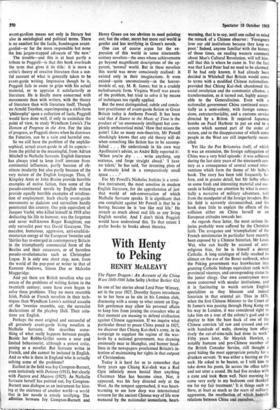The Paper Dragon : An Account of the China Wars
1840-1900 John Selby (Arthur Barker 42s)
With Henty to Peking
HENRY McALEAVY
In one of her stories about Lord Peter Wimsey, set in the year 1927, Dorothy Sayers introduces us to her hero as he sits in his London club, discussing with a crony to what extent an Eng- lish gentleman may allow his personal affairs to keep him from joining the crusaders who at that moment are massing to defend civilisation against Chinese aggression. If we inquire what particular threat to peace China posed in 1927, we discover that Chiang Kai-shek's army, in its campaign to supplant the regime of the war- lords by a national government, was drawing ominously near to Shanghai, and banner head- lines in the newspapers proclaimed Britain's in- tention of maintaining her rights in that outpost of Christendom.
Today it is hard for us to remember that forty years ago Chiang Kai-shek was a Red Ogre infinitely more bestial than anything Chairman Mao has become since. Nor, it appeared, was his fury directed only at the West. As the tempest approached, it was heart- warming to see how deep was international concern for the ancient Chinese way of life now menaced by the nationalist iconoclasts, heart- warming, that is to say, until one called to mind the remark of a Chinese observer: 'Foreigners love our old institutions because they keep us poor.' Indeed, anyone familiar with the history of those times, on reading western comment about Mao's Cultural Revolution, will tell him- self that this is where he came in. Yet the fact was that Lord Peter had no need to be alarmed. If he had only known, it had already been decided in Whitehall that Britain would come to terms with a modified Chinese nationalism, provided that Chiang Kai-shek abandoned the social revolution and the communist alliance, a transformation, as it turned out, highly accept- able to the Generalissimo. Even with a nationalist government China continued essen- tially as a semi-colony, with foreign conces- sions, extraterritoriality, and a customs service directed by a Briton. It required Japanese bombs on Pearl Harbour to put an end to a system which seemed part of the order of nature, and to the disappearance of which some people in the West are still imperfectly recon- ciled.
Yet like the Pax Britannica itself, of which it was an extension, the foreign subjugation of China was a very brief episode: it was achieved during the last sixty years of the nineteenth cen- tury as a consequence of several armed inter- ventions which form the theme of Mr Selby's book. The story has been told frequently be- fore, and in greater detail, but Mr Selby offers us some fresh and interesting material and suc- ceeds in holding our attention by what is essen- tially a narrative of military adventure, told from the standpoint of the foreign invaders. But his field is narrowly circumscribed, and his book does little to explain the effects of the collision either on China herself or on European attitudes towards her.
As regards these latter, the most serious in- juries probably were suffered by the Christian faith. The arrogance and 'triumphalism' of the French missionaries in particular have recently been exposed by a Chinese historian, Mr Louis Wei, who can hardly be accused of anti- religious bias, for be is himself a devout Catholic. A long catalogue of folly reached its climax on the eve of the Boxer outbreak, when the Peking government was browbeaten into granting Catholic bishops equivalent rank with provincial viceroys, and corresponding status to the junior clergy. Our own countrymen were more concerned with secular institutions, and it is fascinating to watch certain English specialities as they blossom and indeed luxuriate in that oriental air. Thus in 1876, when the first Chinese Minister to the Court of St James's was passing through Hong Kong on his way to London, it was considered right to take him on a tour of the colony's gaol and to display to him the bare back of one of the Chinese convicts 'all raw and crossed and cut with hundreds of welts, showing how effec- tively the cat-of-nine-tails had done its work' Fifty years later, Sir Meyrick Hewlett, a notably humane and pro-Chinese member of the British Consular Service, still thought a good hiding the most appropriate penalty for a drunken servant. 'It was either a beating or the sack. He asked to be beaten, so I told him to take down his pants, lie across the office table and not utter a sound. He had five strokes with a cane and took them well. Next morning he came very early to my bedroom and thanked me for my fair treatment.' It is things such as these, at least as much as the scars of military aggression, the recollection of which bedevils relations between China and ourselves.






































 Previous page
Previous page